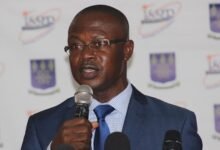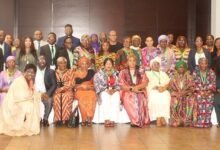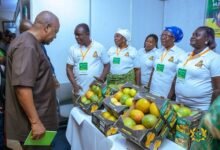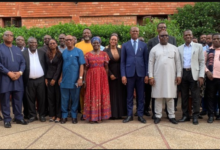
The Ministry of Gender, Children and Social Protection (MoGCSP) has called for recognition and advancement of gender equality in the context of climate change and disaster risk reduction.
According to the Ministry, gender equality and climate change remain central to the country’s Development Agenda as indicated in the National Medium-Term Development Policy Framework for 2022-2025.





The Deputy Minister for MoGCSP, Lariba Zuweira Abudu, said this yesterday at a seminar organised by the Ministry to commemorate the International Women’s Day (IWD) in Accra on the theme “Climate change, empowering the Ghanaian woman for a sustainable tomorrow.”
IWD is a day set aside by the United Nations globally to celebrate the economic, political and social achievements of women, past, present and future. The day is celebrated on March 8 every year and this year’s celebration is on the theme “Equality today for a sustainable tomorrow” with a campaign theme #BreaktheBias.
Mrs Abudu said the policy framework among other key areas would address gender equality and climate change to promote reduction of deforestation, ensure gender equality, increase productive use of clean water, good energy and safer environment.
ANITA NYARKO-YIRENKYI reports that the head, Gender and Youth Desk of the Industrial Commercial Workers Union (ICU)-Ghana, Ms Esinam Poku, in an address, called on the government to ratify the International Labour Organisation (ILO) Convention 190 to protect women from violence and sexual harassment at the workplace.
The convention, also seeks to build a working environment free from gender discrimination and unfair treatment, gender based violence and sexual harassment.
“It was crucial in advancing gender equality at work and advocating for improvements in working conditions and better work life balance and building,” she added
The ICU programme was on the theme “Equal participation of women today for sustainable Union,” brought together national and regional women executives of the union.
She said ICU Ghana had been successful in addressing gender inequality by adopting a two-pronged approach, pushing for general gender equality.
The National Women’s’ President of the ICU, Ms Happy Ahetor, in her remarks urged women to educate themselves to be able to take up every challenge given them.
The Second Trustee of the ICU Ghana, Ms Jemima Bentum, reiterated the call on women to be committed and dedicated to their work and acquire new skills.
The acting Accra Regional Officer of the ICU Ghana, Mr Samuel Ako who was represented by the Education Officer of the Union, Mr Emmanuel Yabani commended the women in the union for contribution over the years.
BERNARD BENGHAN reports that the Minister for the Interior, Mr Ambrose Dery, commended the Ghana Immigration Service (GIS), for setting-up a Gender Mainstreaming Unit to eliminate all gender-based discriminatory regulations and practices within the Service.
He explained that, established three years ago, the Unit, has effectively dealt with gender related issues by applying the principle of gender equality in recruitment, training and development, transfer, welfare, promotion and appointment, hence, the need for other security services to replicate.
It brought together Regional Gender Focal Persons of GIS, the Immigration Ladies Club (IMMILAC), the Gender Mainstreaming Unit and over 300 officers from various sectors.
It was on theme “Gender Equality Today for a Sustainable Tomorrow: Work-Life Balance”.
Mr Dery said, the GIS Gender Policy which was formulated in compliance with the provision of the 1992 Constitution, guarantees equality and the right to freedom from discrimination.
The Deputy Comptroller-General in charge of Finance and Administration, Mr Isaac Owusu Mensah, said, the ratio of female officers to male officers was one is to two.
ABIGAIL ANNOH reports that the “Ladies Club” of the Ghana Revenue Authority (GRA) commemorated this year’s International Women’s Day (IWD) with a challenge on female workers to help attain the revenue target of GHC 80.3 billion projected by Authority for end of this year.
The Commissioner, Support Services Division of the GRA, Ms Julie Essiam, who gave the charge tasked female workers to develop plans and actions that could help reach the expected revenue target for national development.
According to her, “Breaking the Bias” which is the slogan for this year’s celebration should spur women on to rise above limitations, excuses and stereotypes that relegated them to the background.
“We cannot afford to be limited in this day and age by widely held stereotypes that hinder our progress.
We can prove our capability by remaining resolute, focused and committed while eschewing mediocrity and striving for excellence in whatever we do,” she stated.
Ms Esinam implored women to be hardworking, dedicated and committed to change generally held biases which reinforced gender inequality in the country.
National president of the GRA Ladies Club, Vivian Ne-ormah Nyoni, urged the management of the GRA to give women “seats at the table and encourage women to speak out in addition to setting goals around female involvement at all levels.
ABIGAIL ARTHUR reports that the Canadian High Commissioner to Ghana, Kati Csaba assured her government’s commitment for gender equality and women’s empowerment in the country.
She said it was for that reason her country launched the Elsie Initiative for Women in Peace Operations in 2017 to increase military and police women’s meaningful participation in United Nations peace operations.
Ms Csaba made this known when the Ghana Armed Forces (GAF) in collaboration with the Government of Canada and the Elsie Initiatives marked the International Women’s Day (IWD) in Accra yesterday.
Held under the theme ‘Unearthing Female Potential for Sustainable Development,’ the event was the maiden edition to be held by the GAF.
CLEMENT ADZEI BOYE, reports from Takoradi in the Western Region that the Friends of the Nation (FON) has advocated improved conditions for women in mining areas of the country.
It has also suggested the removal of economic and social barriers that undermined the growth of women.
Executive Director of FON, Donkris Mevuta, who made the suggestions yesterday said “We have identified the extractive sector as one of the vehicles to liberate women out of poverty. However, the sector continues to see documented and undocumented norms that are detrimental to the economic, social, and financial freedoms of women.”
BY JEMIMA ESINAM KUATSINU







